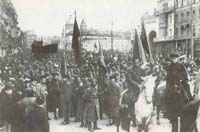Russia celebrates 90th anniversary of Bolshevik Revolution

Russia’s remaining communists are celebrating the 90th anniversary of the Bolshevik Revolution on Wednesday, hoping to attract more supporters ahead of December elections.
Since the collapse of the Soviet Union 16 years ago, the Communist Party has seen its support steadily decline, able to count mainly on the loyalty of pensioners and others who were on the losing end of post-Soviet market reforms.
But in Dec. 2 parliamentary elections, with Kremlin-controlled United Russia now set to sweep the vote, the communists are the only other party considered certain to take seats. This has given the communists new confidence and hope for broadening their support.
Communists from dozens of other countries arrived in Moscow Tuesday for the anniversary. They laid wreaths at the mausoleum of Bolshevik leader Vladimir Lenin and were guests at a party in the evening in the House of Columns, where Soviet dictator Josef Stalin had lain in state.
The festivities were to culminate Wednesday evening with a march through central Moscow. Thousands are expected to take part.
In Soviet times, Nov. 7 was celebrated with grandiose military parades on Red Square and mass rallies. The holiday was renamed and scaled back after the Soviet collapse, but communists continued to celebrate the old holiday with anti-government demonstrations across the country.
In 2005, President Vladimir Putin abolished the Nov. 7 holiday and replaced it with a new holiday on Nov. 4.
Moscow Mayor Yuri Luzhkov, however, staged his own military parade on Red Square on Wednesday. He got around the abolishment of the holiday by dedicating the parade not to the anniversary of the 1917 Revolution but to the parade held on Nov. 7, 1941. Soldiers who marched in the 1941 parade headed directly to the front to fight the Nazis who had advanced to the outskirts of Moscow.
Putin also took the opportunity to reach out to World War II veterans.
"Today on the anniversary of the historic parade on Red Square, we honor those who took up arms to fight for the honor and independence of the fatherland," the president said in a televised ceremony.
The communists narrowly beat the pro-Kremlin bloc in 1999 parliamentary elections with 24 percent but saw their support slide to 12 percent in the last election in 2003, when United Russia was the clear winner with 37 percent.
United Russia is expected to sweep next month's election after Putin announced that he would lead the party's ticket, effectively turning the vote into a referendum on his presidency. The communists are seen as the only other party certain to pull in 7 percent of the vote necessary for winning parliamentary seats.
An October poll by the independent Levada Center showed that the communists have regained some of their lost popularity and now have the backing of 17 percent of Russians. Their nearest rival, the nationalist Liberal Democratic Party, had 6 percent. United Russia was far ahead with 67 percent, according to the poll, which had a margin of error of 3 percentage points.
"Many voters understand that to vote for smaller parties that will not get over the 7 percent threshold would be the same as voting for United Russia," Communist Party leader Gennady Zyuganov said Monday at a meeting with veterans.
With Kremlin controlling national television networks, opposition parties have struggled to get out their messages. It is more of a problem for the fractured democratic parties, which are firmly associated with the hardships and uncertainties of the 1990s.
The communists can still rely on familiar Soviet-era symbols, and in the public mind they are linked to fixed prices and stability, making them perhaps the only political force able to compete with United Russia.
"We are the only real political force that resists the government's social and economic course, calling for the nationalization of natural resources and strategic enterprises," Communist activist Svetlana Savitskaya said in a televised election debate Tuesday.
Putin's own popularity is partially attributed to his Soviet-style, firm-hand rule and his efforts to restore pride in the Soviet past.
Levada Center pollster Denis Volkov said supporters of small parties may give their votes to the communists as a way of opposing United Russia. But he cautioned that the communists' support was mainly a consequence of the weakness of other opposition parties.
Subscribe to Pravda.Ru Telegram channel, Facebook, RSS!


